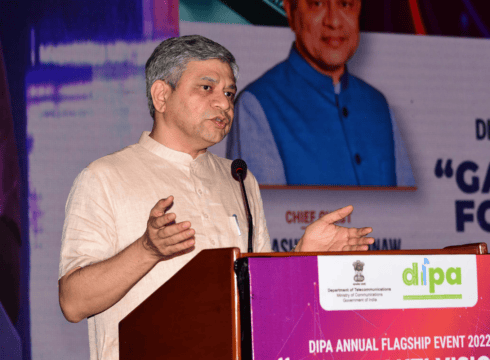Looking to overhaul Indian landscape with a framework that encompasses telecom policy, data protection regime and the IT Act: Vaishnaw
Government investing $30 Bn to ensure last-mile connectivity to 4G and 5G services in every village: IT Minister
IT Minister Ashwini Vaishnaw made the comments during his valedictory speech at the Global Fintech Fest 2022
Inc42 Daily Brief
Stay Ahead With Daily News & Analysis on India’s Tech & Startup Economy
Union minister for electronics and information technology Ashwini Vaishnaw has said that building a robust digital infrastructure and regulatory framework were the key focus areas for the government in the fintech space.
He also added that social inclusion was the cornerstone of the government’s approach towards the fintech industry in the country.
“While we are working in the tech space, we should not forget the change we are bringing in the common citizens’ life, in the life of the poorest of the poor, in the life of youth, our daughters, sisters and mothers. Whatever we do, we should keep every section of the society in mind,” said Vaishnaw.
He made the comments during his address at the third edition of the Global Fintech Fest 2022 organised in Mumbai.
Addressing the gathering, Vaishnaw said that the government was investing nearly $30 Bn to ensure last-mile connectivity to 4G and 5G services in every village across the country. He also added that more than 1.5 Lakh Gram Panchayats had been connected as part of this endeavour.
The government is also working on creating an ecosystem that leverages village entrepreneurs and youngsters to take high speed internet to all villages. The government claims to have tested this model, adding that it was facilitating around 80,000 new connections under this new model every month.
Another major takeaway of the Minister’s speech was that the government was looking to create a consolidated ‘interactive framework’ to address issues of end-users and the industry as a whole.
“We are currently looking at 3-4 legislations cumulatively inclusive of the new telecom bill, the Digital Personal Data Protection Bill and the IT Act of 2000 to create an interactive framework in which the industry’s concerns are addressed by the government and government’s concerns are duly taken into consideration by the industry,” added Vaishnaw.
The Minister also informed the gathering that it had a clear mandate to overhaul the country’s digital regulatory framework that is globally benchmarked and endorses global competitiveness.
This follows a similar statement by Prime Minister Narendra Modi at the same event a few days back, where he said that innovation directed at inclusion was the bedrock of the Indian fintech ecosystem.
Rural India Left Out?
The wave of fintech startups that have emerged in the past few years has sped up the financial inclusion for a good number of Indians, albeit with a caveat. The introduction of India stack or the digital payments revolution or the availability of easy credit have largely fenced themselves around the urban milieu and cater to urban residents.
While the overall internet penetration has increased, the percolation of smartphones and other allied digital services in the hinterlands continues to be abysmal. While these fintech systems have not been overtly exclusionary, the rural belt of the country does not offer enough incentives for these companies to scale up these products.
Besides, there are also issues surrounding matters such as lack of digital and financial literacy that plague the inclusion of backward areas of the country into the mainstream.
However, the government has also ramped up efforts to address the gap. Realising the dearth of access to digital payments in rural areas where feature phones are widely used, the RBI recently launched UPI123PAY. The service allows feature phone users to access digital payments without the need for the internet.
Close on the heels of this, the central bank also onboarded a host of startups for its regulatory sandbox where it tested a clutch of products.
Apart from that, the government has also introduced financial inclusion schemes such as Kisan Credit Cards, Aayushman Bharat and the Jan Dhan Yojana that more or less depend on digital services to link target customers with their benefits.
Not just that, startups such as Mumbai-based rural fintech platform Jai Kisan and rural India-focused insurtech platform DigiSpace are creating a niche in the space and are spurring financial inclusion in the process.
According to an Inc42 report, India’s total addressable fintech market opportunity is projected to hover around the $1.3 Tn mark by 2025.
{{#name}}{{name}}{{/name}}{{^name}}-{{/name}}
{{#description}}{{description}}...{{/description}}{{^description}}-{{/description}}
Note: We at Inc42 take our ethics very seriously. More information about it can be found here.


